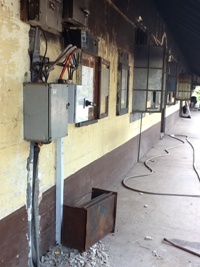Re: BNI, Police probe Lands Commission fire… A Case of Occupiers Liability or “The Hypothetical Reasonable Person” at the Ghana’s Lands Commission?
Asante Fordjour
BRIEFS & MEMOS
It is established that “in a negligence suit, the plaintiff has the burden of proving that the defendant did not act as a reasonable person would have acted under the circumstances. The court will instruct the jury as to the standard of conduct required of the defendant. A plaintiff has a variety of means of proving that a defendant did not act as the hypothetical reasonable person would have acted. The plaintiff can show that the defendant violated a statute designed to protect against the type of injury that occurred to the plaintiff. A plaintiff might introduce expert witnesses, evidence of a customary practice, or circumstantial evidence. Sometimes physical circumstances beyond a person’s control can excuse the violation of a statute, such as when the headlights of a vehicle suddenly fail, or when a driver swerves into oncoming traffic to avoid a child who darted into the street. To excuse the violation, the defendant must establish that, in failing to comply with the statute, s/he acted as a reasonable person would have acted. In many jurisdictions the violation of a statute, regulation, or ordinance enacted to protect against the harm that resulted to the plaintiff is considered negligence per se- unless the defendant presents evidence excusing the violation of the statute, the defendant’s negligence is conclusively established. In some jurisdictions a defendant’s violation of a statute is merely evidence that the Def. acted negligently.” (West’s Encyclopedia of American Law, edn 2)
INTRODUCTION
Today, we are going to look at the Concept of Negligence- arising from legally borrowed French word known as tort or civil wrong. One of the underlying concepts in this area of law is the phrase “the reasonable person,” which provides the standard by which a person’s conduct is measured. The established rule in the law of tort is that a person has acted negligently if s/he has departed from the conduct expected of a reasonably prudent person acting under similar circumstances. The hypothetical reasonable person as the courts had always imputed, provides an objective by which the conduct of others- here, the claimant, is judged. In law, the reasonable person is not an average person or a typical person but a composite of the community’s judgment as to how the typical community member should behave in situations that might pose a threat of harm to the public (ibd).
COMMENTARY
Before we begin with our commentary, let’s consider this: What is occupational safety and health at workplace? Well, according to the International Occupational Hygiene Association, occupational safety is the science of anticipating, recognizing, evaluating and controlling health hazards at the workplace with the objective to protect worker health and wellbeing and safeguard the community at large. As stated by ILO DG in 2009, occupational safety & health is human right and that decent work eventually is safe work. Why is this important? The report has found that workers’ safety and health are not only the concerns of workers and their families but also of enterprises and even national and global economies whose productivity and competitiveness depend on keeping workplaces safe and that around 160 million people suffer from occupational diseases and 2 million people die every year as a result of occupational accidents and work-related diseases and injuries.
The most heart-wrenching revelations here are that similarly, around 337 million fatal and non-fatal accidents occur each year. “Still the figures are quite underestimated as nearly 50% of workplace injuries are never reported, especially in developing countries. Moreover, under-reporting exists because of the failure to recognize the work-related origins of diseases.” In the words of ILO, nearly 5% of world GDP is lost due to occupational diseases and accidents. The annual cost of workplace accidents and diseases has been estimated as US$5 billion. “Hazards in the workplace create both human and economic costs. The recent blaze in a factory in the garment factory in Pakistan where more than 200 workers were burnt to death reminds us about the importance of having a system at workplace which protects workers from such tragedies and accidents.” The GBC/GNA reports of 02 March 2012 stated that the fire razed down some part of the offices of the Ghana Lands Commission, near the 37 Military Hospital. As at the time of going to press, some, if not all the burnt files and other office equipments and fittings, still lay bare due to ongoing investigations.
In that report we were told that seven offices serving the records department, the accounts and the client service units were affected, destroying air conditioners, files, furniture and computers worth thousands of Ghana Cedis. The GNA gathered that the fire outbreak started around 05.00 hours and was detected by a fire officer who was passing by. Under the heading: “BNI, police probe Lands Commission fire”, the citifmonline.com reported that an investigative panel made up of the BNI, the military, police, the fire service and the Commission’s personnel, has been set up to investigate blaze. The Ga-Dangme Youth Association, per citifm, pointed accusing fingers at the Commission, alleging that its officials might have masterminded the inferno so as to get rid of land-related documents to delay the release of Ga-Dangme lands to its rightful owners. The Commission’s Executive Director Dr Odame Larbi, assured that all was not lost and that they have a solid backup to replace the destroyed files. Yet the vice-president of the Ga Association- Nii Marma Marquaye, is quoted as saying: “there is more to this morning’s fire than what meets the eye.”
Today, Ghana is still haunted by sporadic fire outbreaks and the usual remedy, as it appears, are suspicions and fingers-pointing which obviously, ought not to be underestimated but sadly, without comprehensive emphasise on the established rules of duty of care of the Ghanaian to his/her fellow citizen. It is established that a person who undertakes a particular activity- be you a driver or seamstress; is ordinarily, considered to have the knowledge common to others who engage in that activity. For example, a car/lorry driver must know the rules of the road and a product manufacturer must know the characteristics and dangers of its product, at least to the extent they are generally known in the industry. The same is true of the technician or an electrician who professes in that trade. Thus, s/he could be negligent where the practice or conduct falls below the standards of behaviour established by law for the protection of others against unreasonable risk of harm.
In order for one to establish negligence as a cause of action under the law of torts, the claimant must prove that the defendant had a duty to the plaintiff, the defendant breached that duty by failing to conform to the required standard of conduct, the defendant’s negligent conduct was the cause of the harm to the plaintiff, and the plaintiff was, in fact, harmed or damaged. In the realms of real estate, Occupiers’ liability generally refers to the duty owed by land owners to those who come onto their land. However, the duty imposed on land owners can extend beyond simple land ownership and in some instances the landowners may transfer the duty to others, hence the term occupier rather than owner. The term occupier itself is said to be misleading since physical occupation is not necessary for liability to arise. It is perhaps a distinct form of negligence in that there must be a duty of care and breach of duty, causing damage. The rules of remoteness apply to occupiers’ liability in the exact same way that they apply to negligence claims. Liability can arise on occupiers for omissions since their relationship gives rise to duty to take action to ensure the reasonable safety of visitors.
In the Kingdom of Great Britain, Occupiers Liability Act 1957 imposes an obligation on occupiers with regard to ‘lawful visitors’. Liability on occupiers in relation to persons other than ‘his visitors’, is regulated by Occupiers Liability Act 1984. Both Acts impose an obligation on occupiers [here, those in actual occupations- tenants] rather than land owners. The question of whether a particular person is an occupier is a question of fact and depends on the degree of control exercised. The test applied is one of ‘occupational control’ and there may be more than one occupier of the same premises. We mention in passing that the discussion of relevant case law such as Wheat v E Lacon & Co Ltd [1966] AC 552; Harris v Birkenhead Corp [1976] 1 WLR 279 and; of course, the celebrated case of Rylands and Fletcher [1868] UKHL 1, which ruled that “the person who for his own purpose brings on his lands and collects and keeps there anything likely to do mischief, if it escapes, must keep it in at his peril, and if he does not do so, is prima facie answerable for all the damage which is the natural consequence of its escape”, worth yes, mentioning in this discussion.
The law considers a variety of factors in determining whether a person has acted as the hypothetical reasonable person would have acted in a similar situation. These factors include the knowledge, experience, and perception of the person, the activity the person is engaging in, the physical characteristics of the person, and the circumstances surrounding the person’s actions. Thus, it is suggested that if a driver sees another car approaching at night without lights, the driver must act reasonably to avoid an accident, even though the driver would not have been negligent in failing to see the other car. In the absence of unusual circumstances, a person must see what is clearly visible and hear what is clearly audible. From this premise, it is argued that a driver of a car hit by a train at an unobstructed railroad crossing cannot claim that s/he was not negligent because s/he did not see or hear about the incoming train, because a reasonable person would have seen or heard the train.
Thus in everything we do, we owe duty of care to our neighbour, whom we must always have in contemplation. This neighbourhood principle as developed by Lord Atkin in the celebrated case of Donoghue v Stevenson [1932] AC 562 (HL Sc) (Snail in the Bottle case), establishes when such a duty of care might arise. The principle is that one must take reasonable care to avoid acts or omissions that could reasonably be foreseen as likely to injure one’s neighbour. A neighbour was identified as someone who was so closely and directly affected by the act that one ought to have them in contemplation as being so affected when directing one’s mind to the acts or omissions in question. So a reasonable lands commission; for example, ought to know that burnt office files and electrical wires are dangerous to the general health if they are left bare, unsecured and opened to inhalation of its workers, clients or visitors; by for days, months, years or even minutes or seconds.
Of course, it is said that the law recognises that even a reasonable person can make errors in judgment in emergency situations. The Lands Commission, for example, with an ageing flying-over and dangling flooring and walling electrical cables and fuses, ought to have considered the possibility of a fire. So failure to guard against such emergencies can constitute negligence. Accordingly, it has been found that a reasonable person must even foresee the unlawful or negligent conduct of others if the situation warrants. For example, you may be found negligent for leaving your car unlocked with the keys in the ignition because of the foreseeable risk of theft, or for failing to slow down in the vicinity of a school yard where children might negligently run into the street.
In proofing negligence, the courts have said that the plaintiff, will need an expert witness to establish that the defendant did not adhere to the conduct [Health & Safety regulations at workplace] expected of a reasonably prudent person in the defendant’s circumstances- and here, the Lands Commission. It is said that a plaintiff’s evidence of conformity or nonconformity with a customary practice does not establish whether the defendant was negligent; the jury decides whether a reasonably prudent person would have done more or less than is customary. Sometimes a plaintiff in a negligence lawsuit must prove his entire case by circumstantial evidence. This illustration is given: “A plaintiff’s shoulder is severely injured during an operation to remove his tonsils. He was unconscious during the operation, sues the doctor in charge of the operation for negligence, even though he has no idea how the injury actually occurred. The doctor refuses to say how the injury occurred, so the plaintiff will have to prove his case by circumstantial evidence.”
The West’s Encyclopedia of American Law argues that in cases such as this, the doctrine of Res Ipsa Loquitur (the thing speaks for itself) could be invoked. Res ipsa loquitor allows a plaintiff to prove negligence on the theory that his injury could not have occurred in the absence of the defendant’s negligence. “The plaintiff must establish that the injury was caused by an instrumentality or condition that was under the defendant’s exclusive management or control and that the plaintiff’s injury would not have occurred if the defendant had acted with reasonable care. Thus, in the above example, the plaintiff can use res ipsa loquitor to prove that the doctor negligently injured his shoulder.” In law it is said that if a person engages in an activity requiring special skills, education, training, or experience, such as piloting an airplane, the standard by which his/her conduct is measured is the conduct of a reasonably skilled, competent, and experienced person who is a qualified member of the group authorised/ licensed to engage in that activity.
In relation a person’s physical characteristics, the law takes into account in determining whether that person’s conduct is negligent. But this is measured against a reasonably prudent person with the same physical characteristics. Accordingly, a physically impaired individual cannot be expected to conform to a standard of conduct that would be physically impossible for him/her to meet. On the other hand, a physically challenged person must act reasonably in light of her handicap, and s/he may be negligent in taking a risk that is unreasonable in light of his/her known physical limitations.
The cited example here is that a person who causes a forest fire by failing to extinguish his campfire cannot claim that he was not negligent because he lacked the intelligence, judgment, or experience to appreciate the risk of an untended campfire. In law, evidence of voluntary intoxication will also not excuse conduct that is otherwise negligent because it is the person’s conduct, not his or her mental condition that determines negligence. . If a child engages in what is considered an “adult activity,” such as driving a car or flying an airplane, s/he will be held to an adult standard of care.
But at common-law, a plaintiff whose own negligence was a contributing causes of his/her injury was barred from recovering from a negligent defendant. For example; both workers and visitors, are strongly advised to uphold health and safety standards at the places they occupy or work. Putting this in context, what could the plaintiff exposed to the hazardous environment at the Ghana Lands Commission, do? This could be difficult to establish; probably, due to lack of detailed health records. It has been found that sometimes a plaintiff’s injury might result from more than one cause. Accordingly, the Commission might argue on “intervening cause”- an injury occurring sub-sequent to the defendant’s negligent conduct. It might also bid for contributory negligence but only if the Commission’s Health & Safety checks, rules and policies had been robust, transparent and orderly.
……………………………….
This report must be read as if it was written in April 2013.
JusticeGhana



